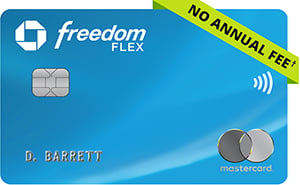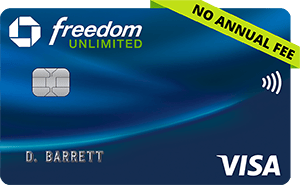Chase Freedom Flex vs. Freedom Unlimited: Pick Your Style
They have similar names and some identical features. But the difference in ongoing rewards requires looking inward.

Many or all of the products on this page are from partners who compensate us when you click to or take an action on their website, but this does not influence our evaluations or ratings. Our opinions are our own.
The Chase Freedom Flex® and the Chase Freedom Unlimited® have certain things in common. Both are cash-back credit cards with super-generous bonuses, long 0% APR periods, no annual fees and names plucked from motivational posters.
Their ongoing rewards structures share some similarities, too, but that's also where there's the most daylight between them.
Here's how to choose which one is right for you.
on Chase's website
on Chase's website
Earn a $200 Bonus after you spend $500 on purchases in your first 3 months from account opening.
Earn a $200 Bonus after you spend $500 on purchases in your first 3 months from account opening.
5% back on quarterly bonus categories that you activate, on up to $1,500 per quarter in spending.
None.
• 5% cash back on travel purchased through Chase.
• 3% cash back at restaurants, including takeout and eligible delivery services.
• 3% cash back on drugstore purchases.
• 5% cash back on travel purchased through Chase.
• 3% cash back at restaurants, including takeout and eligible delivery services.
• 3% cash back on drugstore purchases.
1% cash back.
1.5% cash back.
As noted in the table above, both products offer these identical rewards on certain categories:
5% cash back on travel purchased through Chase.
3% cash back at restaurants, including takeout and eligible delivery services like Grubhub, DoorDash and Uber Eats.
3% cash back on drugstore purchases.
Plus, for new and existing cardholders through September 2027, both cards will also earn 2% back on qualifying Lyft services purchased through the Lyft app.
From there, though, the cards go their separate ways.
The Chase Freedom Flex® offers rotating 5% bonus categories
Aside from the ways to earn extra cash back listed above, the Chase Freedom Flex® also earns 5% back in bonus categories that change each quarter, on up to $1,500 in combined quarterly purchases (category activation is required every three months). All other non-bonus-category purchases earn 1% back.
In this way, the card works much like the original, decommissioned Chase Freedom®.
The Chase Freedom® still exists but is closed to new applicants. It can be product-changed to a Chase Freedom Flex® if you call Chase and make the request. There is also yet another rewards-earning Freedom product — the Chase Freedom Rise® — but unlike the other cards, it is meant for beginners to credit.
The Chase Freedom Unlimited® offers a solid flat rate on 'everything else'
The Chase Freedom Unlimited® does not feature 5% rotating bonus categories.
Instead, any purchases you make outside of the card's fixed, ongoing bonus categories listed above will earn a flat 1.5% cash back.
» MORE: What is the 'Chase trifecta'?
How do you pick between the Chase Freedom Flex® and the Chase Freedom Unlimited®?
The choice between these cards comes down to how you spend money and how much appetite you have for managing your rewards:
Spending habits: Do you spend enough in the Chase Freedom Flex® bonus categories to make the card worth the effort? Take a look at current and past categories here. If these kinds of categories represent a significant chunk of your budget, then the 5% card is a good fit. If your spending is all over the place, the Chase Freedom Unlimited® might be the better option long term.
Complexity: Beyond its fixed bonus tiers, the Chase Freedom Unlimited® doesn't require as much tracking, and you won't have to opt in to any bonus categories. But the Chase Freedom Flex® requires you to activate (and keep track of) quarterly categories, and it knocks down your rewards rate to 1% back once you hit the $1,500 quarterly limit.
Looking for value with less fuss? Go with the Chase Freedom Unlimited®
The Chase Freedom Unlimited® is the better choice if you want a card with simpler terms.
It's better for the budgeter. The Chase Freedom Unlimited® is more predictable. You don't need to tailor your spending to rotating bonus categories to get a good rewards rate. That makes it easier to avoid overspending.
Say the Chase Freedom Flex® is paying 5% back on purchases at Amazon.com. If you don't normally shop there, you might feel compelled to change your habits — and potentially spend more — to get the extra rewards.
It’s lower-maintenance. The Chase Freedom Unlimited® doesn't require you to activate categories every quarter. Basically, this card helps you earn robust rewards with less effort. It won't leave you Googling spending categories in the checkout lane.
It pairs well with other cards. The Chase Freedom Unlimited® is a great companion to the other reward cards in your wallet, such as co-branded airline cards and gas cards. Depending on the quarter, the Chase Freedom Flex® bonus categories might clash with the kind of spending that those other cards in your wallet reward most.

Willing to spend time to maximize rewards? Go with the Chase Freedom Flex®
The Chase Freedom Flex® is your card if you like to squeeze the most value from every purchase.
It offers useful 5% categories. Let's start with its 5% bonus categories, noted here:
Chase Freedom® and Chase Freedom Flex® bonus rewards categories for 2026 | |
|---|---|
Q1 (Jan. 1-March 31) |
|
Q2 (April 1-June 30) | TBD. (In 2025: Amazon; select streaming services. June only: Eligible internet, cable and phone services.) |
Q3 (July 1-Sept. 30) | TBD. (In 2025: Gas/EV charging; live entertainment; Instacart.) |
Q4 (Oct. 1-Dec. 31) | TBD. (In 2025: Chase Travel℠; department stores; Old Navy. December only: PayPal.) |
These broad categories make it easier to reach your quarterly maximum. For example, if the current 5% category is gas stations, you can use your card to buy a gift card for a restaurant you frequent from the gas station’s store. In effect, you're earning 5% back on restaurants, too.
You get fixed, tiered rewards on top of all that. In addition to the card’s rotating 5% categories, it rewards spending at restaurants and drugstores year-round. That's a hard combination to find.
All told, if you can reach the quarterly spending caps on the Chase Freedom Flex® without spending more than you normally would, it becomes much more valuable over time than the Chase Freedom Unlimited®.
Why not both?
If you're having trouble choosing between the Chase Freedom Flex® and the Chase Freedom Unlimited®, here's a simple solution: Get both.
These cards are often treated like rivals, but they work really well together. Use the Chase Freedom Flex® for its 5% categories and the Chase Freedom Unlimited® to earn more than 1% back on everything else. You can even transfer your rewards between accounts and redeem them all in one go. If you do decide to get both, space out your applications by at least a few months to minimize the impact to your credit score.
Both cards offer excellent value on their own. But together, they become even more valuable.
Information related to the Chase Freedom® has been collected by NerdWallet and has not been provided or reviewed by the issuer of this card.
Capital One Venture Rewards Credit Card
Travel
For a limited time, the Capital One Venture Rewards Credit Card is offering new cardholders an especially rich bonus: Enjoy $250 to use on Capital One Travel in your first cardholder year, plus earn 75,000 bonus miles once you spend $4,000 on purchases within the first 3 months from account opening - that’s equal to $1,000 in travel!
Find the right credit card for you.
Whether you want to pay less interest or earn more rewards, the right card's out there. Just answer a few questions and we'll narrow the search for you.












